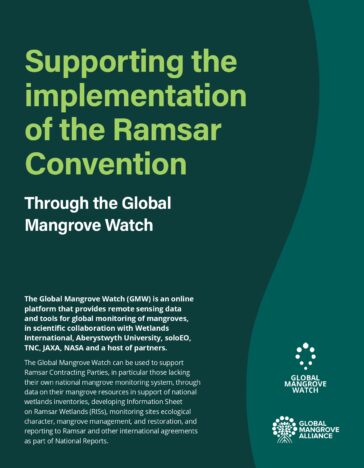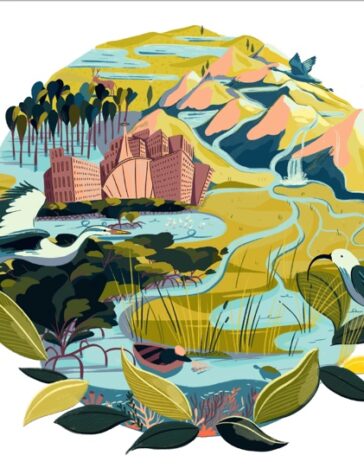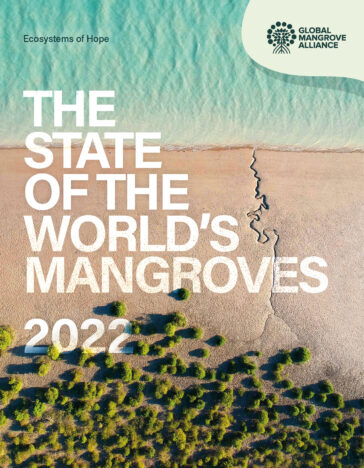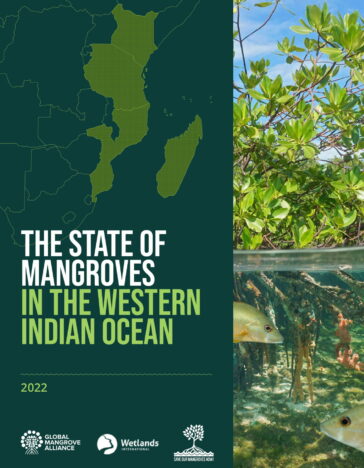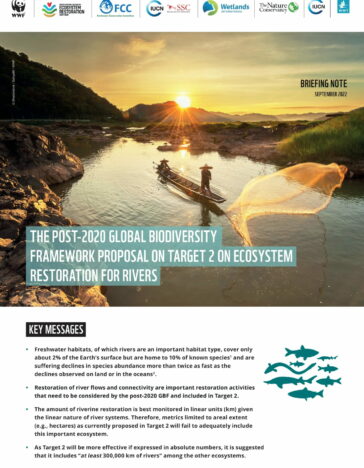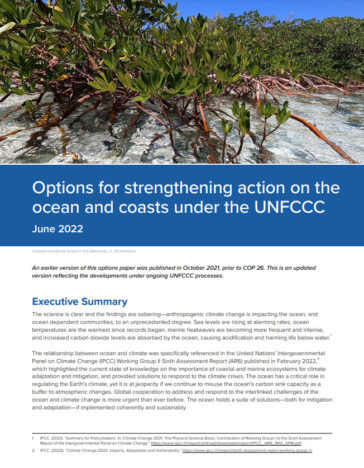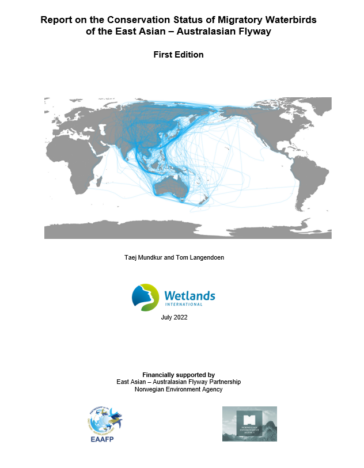
Ramsar COP14
Date: 05/11/2022 – 13/11/2022
Venue: Hybrid [Online + in-person] in Wuhan, China and Geneva, Switzerland
The Ramsar Convention is the intergovernmental treaty that provides the framework for the conservation and wise use of wetlands and their resources. This November, world leaders will convene for the14th Meeting of the Conference of the Contracting Parties (COP14). See here for more information.
Why does COP14 matter?
- COP14 is a unique forum to address global wetland decline
- It is a milestone to scale up actions for wetlands ahead of Climate COP27 and Biodiversity COP15
- It provides avenues for stakeholder dialogues to mobilize investments
- It will highlight the importance of urban wetlands in city planning
- Governments have the opportunity to input critical suggestions for achieving the Paris Agreement, Global Biodiversity Framework and the SDGs.
It is increasingly evident that countries will be unable to meet their climate and biodiversity targets without immediate action to restore and conserve their degraded wetlands. It is critical, therefore, that governments raise ambition and scale up conservation of wetlands.
Our side events in Geneva
Monday, 7th November
Global Mangroves into 2030/2050
Details:Time: 12:15 CET
Venue: Plenary C
This side event will review the progress and challenges on global mangrove conservation, promote consensus among stakeholders in protecting mangrove and blue carbon, and mobilize science-based innovation and synchronized actions in the next decade, under the vision 2050 on biodiversity.
Lead organisation: Mangrove Foundation (MCF)
Partner organisations: National Forestry and Grassland Administration PRC, UNDP-GEF, UN Ocean, IUCN, WWF, Wetlands International, The Global Mangrove Alliance
The Universal Declaration of the Rights of Wetlands: A Paradigm Shift to Meet Global Challenges
Time: 12:15 CET
Venue: Plenary E
Details: The Side Event will include a presentation sharing the Declaration, Rights of Wetlands, and case studies, including the Aotearoa/New Zealand Whanganui River case study; a knowledge exchange with Indigenous Peoples and local community leaders; and a panel discussion with experts from the domains of environmental law, wetland ecology, and conservation practice to discuss ways of operationalizing these rights at national and community levels.
Lead organization: Society of Wetland Scientists
Partner organisations: Wetlands International
Delivering the Global Biodiversity Framework: Inland Water Global Restoration Targets for the next Decade
Time: 12:15 CET
Venue: Plenary F
Details: WWF, TNC, IUCN, BLI, WI and WWT will present the policy briefs on river connectivity and inland water restoration, which propose area-based sub´-targets for river and inland water ecosystem restoration. Ramsar Parties will also present best practices on river and inland water restoration with a view of sharing successes on reversing biodiversity loss and inspiring others to take early action to achieve these goals set for the end of the Decade.
Lead organization: WWF
Partner organizations: TNC, IUCN, Wetland International, Birdlife, WWT
Launch of the 2022 IUCN situation analysis on intertidal wetlands in the Yellow Sea (PRC, DPRK, and RoK)
Details:Time: 19:45 CET
Venue: Plenary F
This event, supported by the Ministry of Oceans and Fisheries of the Republic of Korea and facilitated by IUCN and the EAAFP Secretariat, will provide an opportunity for three Ramsar Contracting Parties (PRC, DPRK and RoK), experts and partners from the Yellow Sea region to consider the key results of this updated report and their implications in terms of conservation and management of intertidal wetlands, with a focus on transboundary cooperation.
Lead organisations: IUCN, East Asian-Australasian Flyway Partnership
Partner organisations: Ministry of Oceans and Fisheries of the Republic of Korea, Korea Marine Environment Management Corporation, Birdlife International, Royal Society for the Protection of Birds, Wetlands International, Hanns Seidel Foundation, Korea Getbol World Heritage Pro
Tuesday, 8th November
World Coastal Forum
Time: 13:15 CET
Venue: Plenary F
Details: The World Coastal Forum has been developed by a consortium of international NGOs with national governments and governmental agencies, regional organizations, sub-national and local governments, international and intergovernmental organizations, academic institutions, and civil society organizations, private sector organizations, and global and regional initiatives as a response to Convention on Wetlands Resolution XIII.20, “Promoting the conservation & wise use of intertidal wetlands & ecologically-associated habitats” and Resolutions/Decisions of CMS, CBD & IUCN.
Lead organizations: Ministry of Natural Resources of China, National Forestry and Grassland Administration of China, BirdLife International & Eco Foundation Global
Partner organizations: Department of International Cooperation, Ministry of Natural Resources of China, Department of International Cooperation, National Forestry and Grassland Administration of China, Department of Wetland Management, National Forestry and Grassland Administration of China, Yancheng Municipal People’s Government, Jiangsu Province, China, Wetlands International and other World Coastal Forum Establishment Group members
Mobilizing climate finance for Biodiversity and Wetlands: lessons from evaluations
Time: 13:15 CET
Venue: Room 4
Details: In order to achieve the much needed paradigm shift in climate change action, both public and private sector finance have to come together to address financing gaps and scaling opportunities in view of the climate and biodiversity crisis. This session will focus on the state and role of private finance in climate adaptation and wetland conservation.
Lead organization: Independent Evaluation Unit, Green Climate Fund
Partner organizations: ADB-IED, CIFOR-ICRAF, SCBD, CIF
Regional Collaboration for Wetlands Wise Use in South Asia
Time: 18:30 CET
Venue: Plenary F
Details: National focal points from South Asia will discuss Ramsar Convention implementation activities in their respective countries and suggest major opportunities and challenges that can be addressed through regional collaboration. International organizations, wetlands managers, and experts will also discuss ways in which regional collaboration can enhance the aims and objectives of the Ramsar Convention and meet the wise use commitments.
Lead organisation: Wetlands International South Asia
Partner organisations: Ramsar Regional Center East Asia International Water Management Institute GIZ-India (Indo-German Biodiversity Programme)
Wednesday, 9th November
Global Mangrove Watch – State of the World’s Mangroves
Time: 13:15 CET
Venue: Plenary C
Details: This side event will demonstrate how the GMW datasets and user tools can be used to support Ramsar Contracting Parties – in particular those without their own national mangrove monitoring systems – with data on their mangrove resources in support of national wetland inventories, mangrove management, and restoration, and reporting to Ramsar and other international agreements.
Lead organisation: Japan Aerospace Exploration Agency (JAXA)
Partner organisations: Global Mangrove Watch Partnership (Aberystwyth University, soloEO, Wetlands International, and The Nature Conservancy) The Group on Earth Observations (GEO Wetlands)
75 at 75
Time: 13:15 CET
Venue: Room 14
Details: The session will showcase India’s journey in wetlands conservation, lessons learnt, and best practices, followed by an interactive panel discussion with wetland managers and representatives from State Wetland Authorities, and a moderated discussion on various policy, programming and regulatory dimensions of wetlands conservation in India.
Lead organisations: Ministry of Environment, Forest and Climate Change, India
Partner organisations: Wetlands International South Asia Deutsche Gesellschaft für Internationale Zusammenarbeit (GIZ)
Capturing climate co-benefits of wetlands
Time: 18:30 CET
Venue: Plenary F
Details: The side event will bring together the international and national experts, site managers, and government officials involved in integrating climate risks into wetland management to present and share their experiences and lessons learnt with the international wetland community, followed by a panel discussion with experts, officials, and practitioners towards bridging the science-policy-practice for wetlands as a climate solution.
Lead organisations: Deutsche Gesellschaft für Internationale Zusammenarbeit (GIZ) GmbH
Partner organizations: Ministry of Environment, Forest and Climate Change (Government of India), Wetlands International South Asia
Thursday, 10th November
Wetlands – crucial for national climate commitments
Time: 18:30 CET
Venue: Plenary C
Details: The session will see the launch of a report and analysis on the role of wetlands in commitments under the Climate Convention (UNFCCC). The report provides guidance for filling wetland-related gaps facilitating countries’ planning and implementation of NDCs as a means to achieving climate action.
Lead organisation: Wetlands International
Partner organizations: Food and Agriculture Organization of the United Nations – FAO, Greifswald Mire Center, The Ramsar Secretariat, GPI/UNEP
Wetlands mapping: Focus on National Initiatives
Time: 18:30 CET
Venue: Room 14
Details: The side event would present a few national initiatives aiming to implement Earth Observation-based mapping tools in support of wetland inventories, by focusing on existing projects in different countries, in particular in Europe and Africa.
Lead organisation: Tour du Valat
Partner organisations: Ministère de la Transition Écologique (France), Office Français de la Biodiversité, Group on Earth Observation, GEO Wetlands, Agence Gabonaise d’Études et d’Observations Spatiales, European Space Agency, Wetlands Internartional, MedWet
GEO Wetlands Initiative: Supporting Global and National Wetlands Inventories with Earth Observations
Time: 19:45 CET
Venue: Room 14
Details: Participants will learn about the current applications of Earth Observation for wetlands, the future developments, and how GEO Wetlands intends to contribute to the implementation of the Ramsar Strategic Plan and support Contracting Parties in building their national wetland monitoring.
Lead organisation: Group on Earth Observations
Partner organisations: JAXA, ESA, Tour du Valat, AIRCAS, Data Terrra Frenh Researh Infrastructure, AGEOS, Wetlands International, soloEO, Earth Research Institute UC Santa Barbara, NASA, USGS, UNEP
Saturday, 12th November
Collaboration to meet global goals on nature, climate and people – the importance of protecting and conserving Ramsar sites
Time: 13:15 CET
Venue: Plenary F
Details: The session will showcase presentations overviewing global and local challenges facing wetlands, the importance of Ramsar to the future role of protected areas in meeting global targets closing with an open discussion on how to restore and better manage wetlands.
Lead organization: IUCN
Partner organisations: BirdLife International, International Water Management Institute, Wetlands International, Wildfowl and Wetlands Trust, WWF, and International Crane Foundation
The Future of Wetlands – an Intergenerational Dialogue
Time: 19:45 CET
Venue: Plenary C
Details: This side event will involve an intergenerational dialogue between youth who are working on wetlands, and a number of experienced wetland professionals. They will discuss the implementation of the youth draft resolution, key challenges to the wise use of wetlands in coming decades, synergies with other MEAs, and how to stay positive.
Lead organisation: Youth Engaged in Wetlands
Partner organisations: East Asia-Australasian Flyway Partnership (EAAFP), Wetlands International (WI), Wildfowl & Wetlands Trust (WWT), World Wide Fund for Nature (WWF), ASEAN Centre for Biodiversity (ACB), Ramsar Convention on Wetlands Secretariat (TBC), Mangrove Conservation

